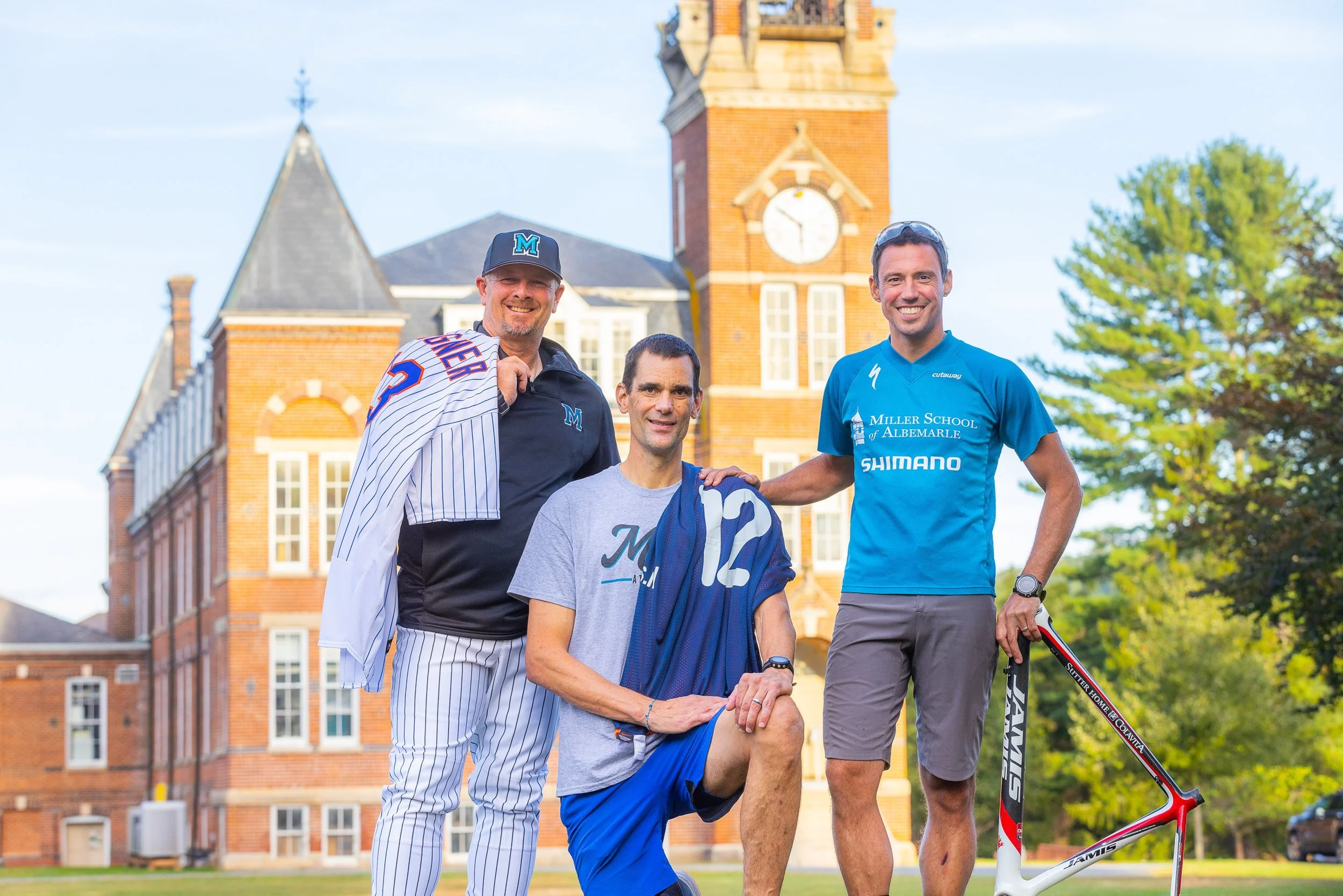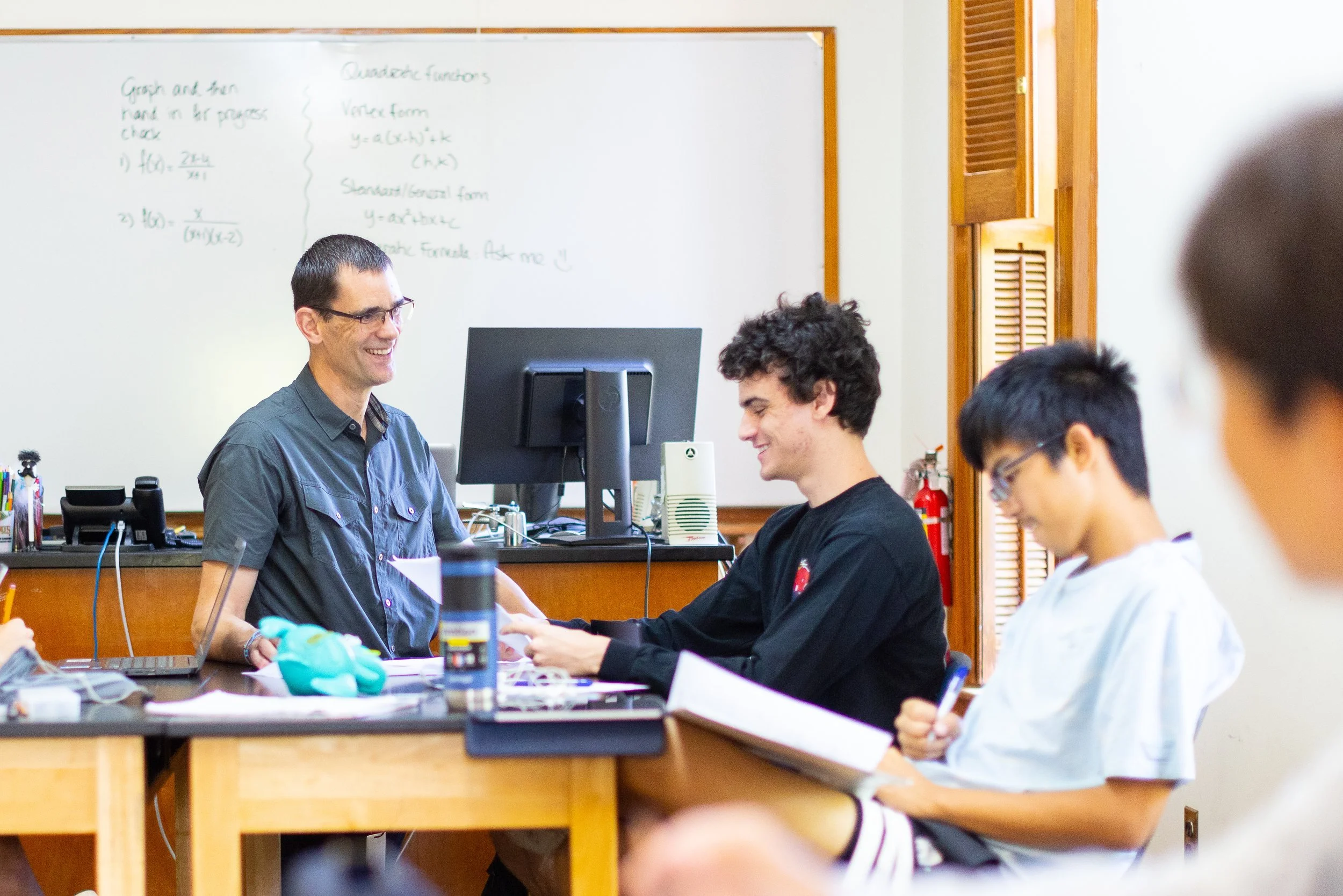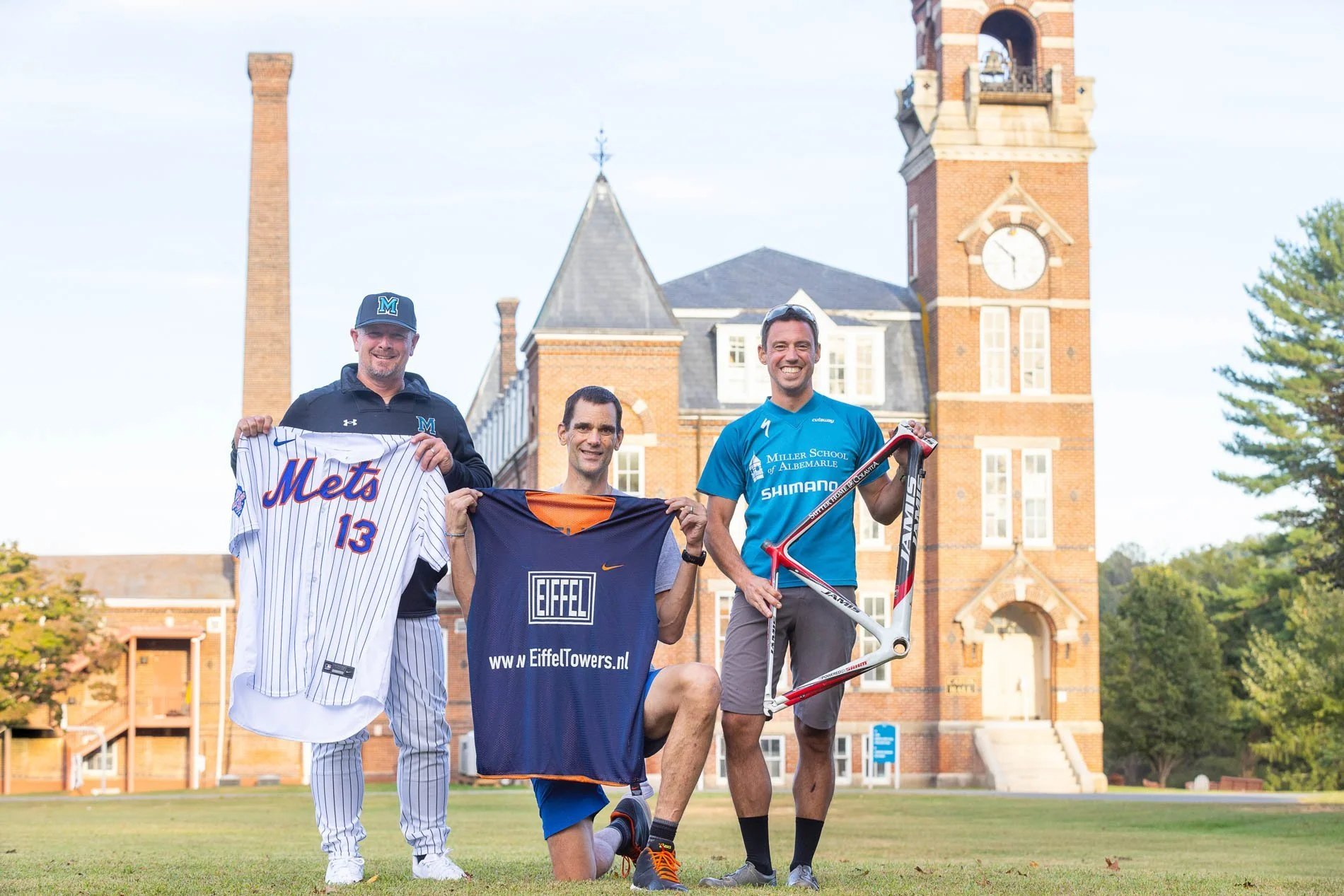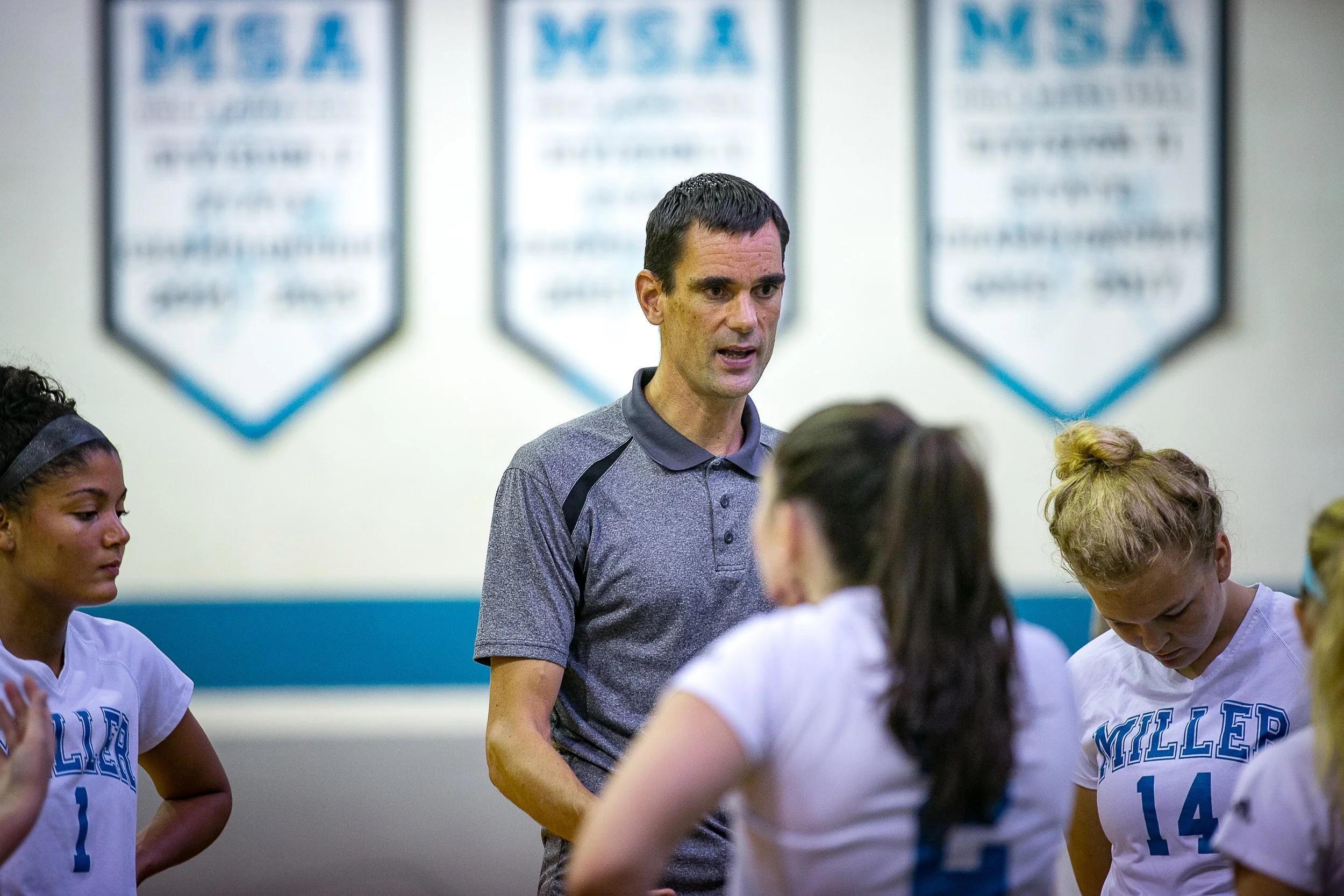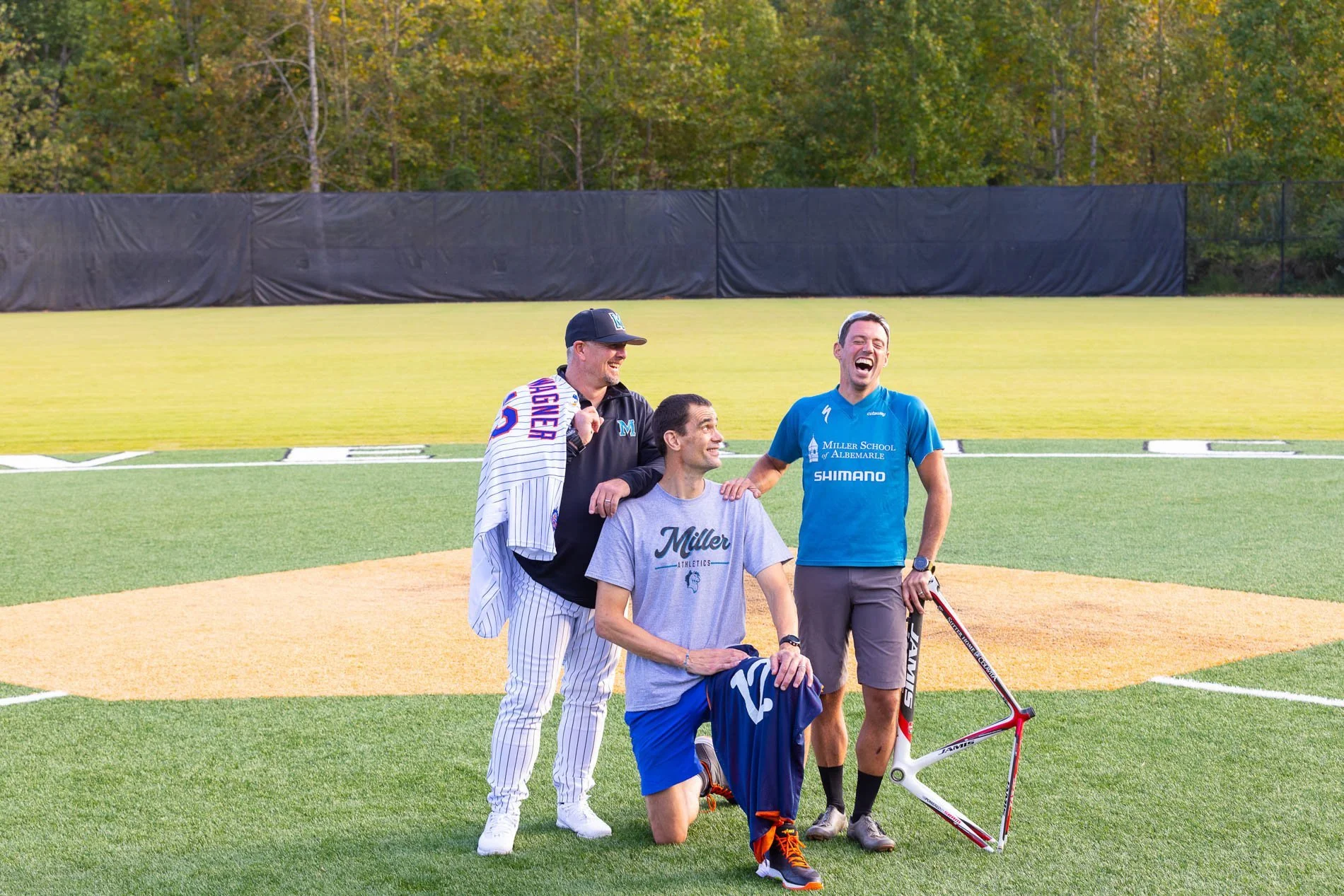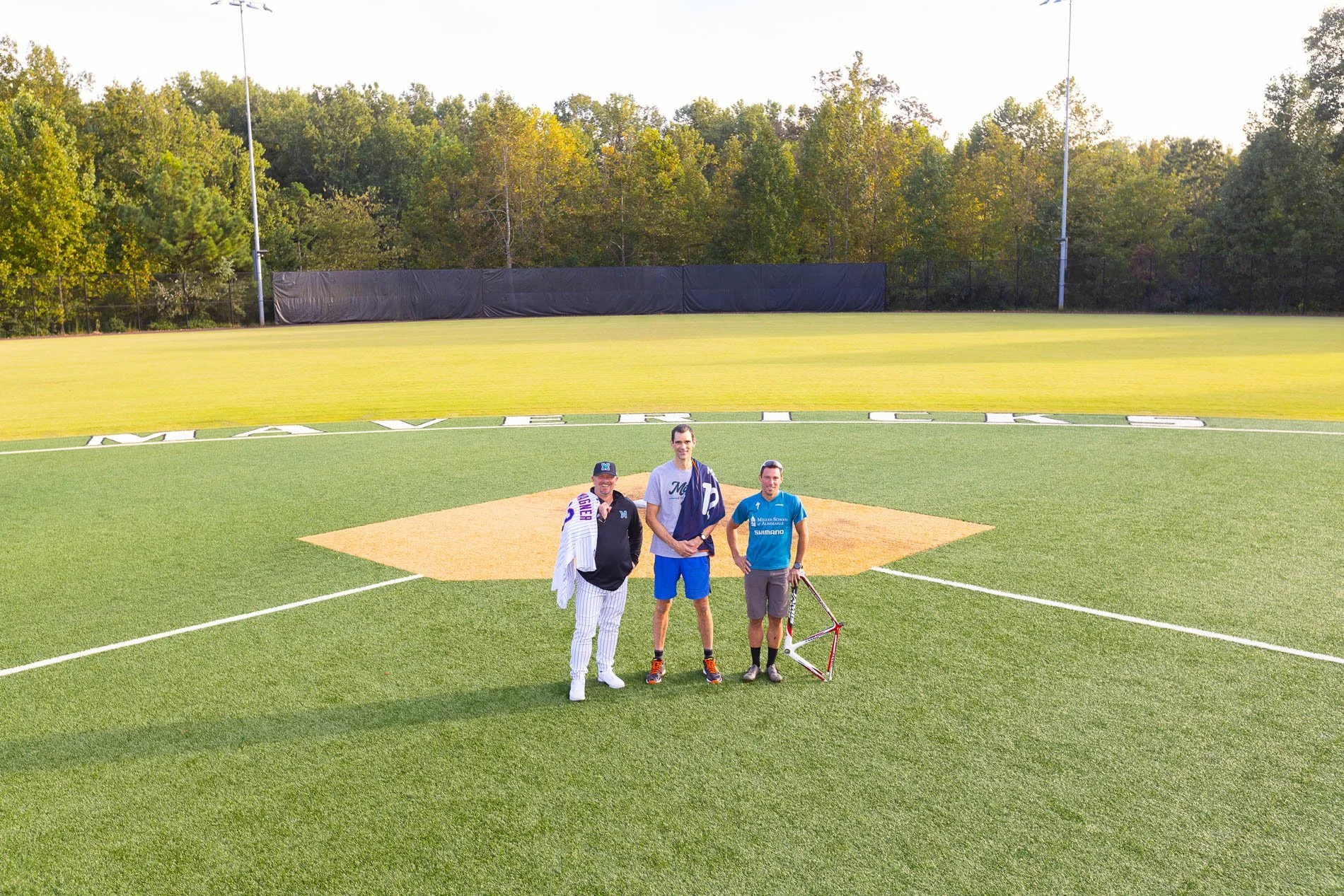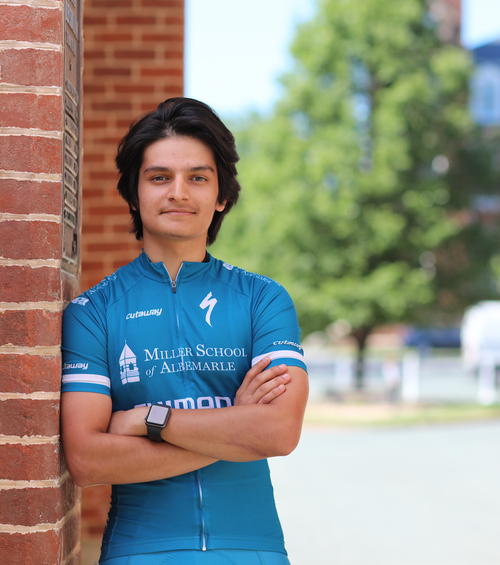So Pro
Billy Wagner, Ralf Melis, and Andy Guptill.
To be a professional athlete, you must have incredible passion. Every moment of your life becomes dedicated towards a very clear goal. You need the determination to be the best when your team is depending on you, and ultimately, to be the best for yourself. Here at MSA, no one knows this better than coaches Ralf Melis, Andy Guptill and Billy Wagner. We are honored to have these former pro athletes as part of our community at the Miller School, imparting their wisdom and sharing their experiences at the elite level to our body of keen student-athletes. I sat down with them to learn a little about each of their illustrious careers, and the world of professional sports.
First, I took a trip over to the Math Building to meet with Mr. Melis in his classroom, its walls lined with various colorful awards and still shots from his career. The classroom is where he has taught everything from Algebra to AP Statistics over the past 11 years. Long before he could call Miller home, he was on a journey to playing NCAA Division 1 Basketball at the University of North Carolina at Asheville. He would maintain a 4.0 GPA, which earned him the accolade of Academic All-America choice in the 1994-95 season, and he’d be voted the Big South Conference’s top newcomer.
The journey to becoming the Mr. and Coach Melis that students know today started when he was around the end of his elementary school years, back in his hometown of Oldenzaal in the Netherlands. His brother playing basketball sparked his interest in the game, so he started playing after trying out on an open day. “About two years in, I realized that both my parents were basketball coaches,” he said. His parents served as his first true mentors, and through the various coaches he had at different points of his high school career, he told me he would always spend the most time on court with his father. Melis started to get serious about the sport as a freshman in high school, after he moved to the US for just a year, where he was inspired by the college basketball he saw enough to decide that it was what he wanted to do. He was named league MVP twice during his high school career back in the Netherlands following two successful Dutch National Championship seasons.
Four years of high school later and after sitting out most of the last 3 years due to a knee injury, the 6’9 Dutchman was ready to transfer to a UNCA in the US and get his head back into the game. When asked about the sacrifices he had to make in order to pursue his goal, he responded, “Everything!,” with a chuckle. “The only thing I did in high school was I played basketball,” he said. While his friends went out to socialize on Friday and Saturday nights, Melis was either in the gym, at a game, on the road, or at a selection team event.“But that was fine, because that’s what I wanted to do,” he added. He pointed out that when it comes to something you enjoy and love doing, it stops becoming a sacrifice. He agreed that it is this kind of work ethic that separates the elite athletes from the rest. “It’s the willingness to do it all the time; even when you’re having a bad day you still have to go,” he remarked. “I was only willing to do it until I no longer liked it,” he said. When the taxing lifestyle started to get in the way of his other passions, he explained that things started to become more practical. With injuries hindering even his ability to walk at a point, he started to look for other things to pursue. “It became a job, and doing sports for a job is really hard,” he told me. I asked him what advice he gives to aspiring professional athletes at Miller. He explained that even at the collegiate level, balancing a sport with classes is a huge responsibility and commitment, so one must truly enjoy their sport to achieve success. “You’ve got to show up,” he said. He looked back at his choice to focus on athletics rather than academics, and talked about how he could have potentially opened up more doors for himself had he pursued academics. In reality, he decided what was important for him at the time. He compared and contrasted the support that he received in high school in terms of an academic and athletic balance, to the support he sees provided at Miller. He said dryly in classic Mr. Melis fashion: “My high school teachers could care less about me missing school.” This is not the case at MSA by far. Coaches and teachers work together to provide students the best environment possible, and Mr. Melis uses his experience to help facilitate that. He likened his quiet, calm demeanor and prepared way of coaching and teaching to his greatest mentor: his Father.“Not as good as he is!” he had to humbly interject.
“Most elite athletes will say I want to be better, and I want to be the best. So I wanted to be better, and I wanted to be the best.” - Andy Guptill
Next, I made my way to the Endurance Room to talk to Andy Guptill. Coach Guptill’s unfading enthusiasm and passion for riding bikes is contagious. He likes to keep the focus on sharing his passion for bike riding, and rarely tells tales of his career as a professional road and mountain biker out of characteristic humility. Without hesitation he agreed to be interviewed, so we could receive some exclusive insight into his remarkable career. He explained to me the inception of his passion for riding bikes started out as a necessity for the youngster in rural upstate New York. “For me, cycling was a necessity for transportation. If I wanted to hang out with my friends, I was riding my bike there.” Guptill was already riding up to 15 miles just to meet with friends in middle school. He raced his first mountain bike race at the age of 13, which sparked a more serious interest in the sport. But, he was not ready to give up the social aspect of student life and “the draws of high school” just yet. “I really started to hone in on cycling when I was around 16 years old and made that my sole athletic endeavor,” he said.
From then on, Guptill’s dedication to cycling only grew through his high school years, continuing into his time at Fort Lewis College: a hub for determined and talented young cyclists in Durango, Colorado. Throughout these years, Guptill had several mentors of his own. He speaks fondly of Nick Bove, a gentleman who owned the local bike shop where Guptill bought his first “nice” mountain bike. “Hey, you can’t have a bike that nice and not do a race!” Guptill quotes Mr. Bove. This attitude of challenging yourself is very similar to one that Coach Guptill is keen to share with MSA student athletes. He described how his relationship with Mr. Bove started to develop. “Just a few weeks after I bought that first bike, he brought me to my first ever mountain bike race, which was a hook for me in the sport. So he became a mentor after that just to talk bikes and talk about racing.” Coach Guptill explained that Mr. Bove remains a close friend in his life, and his advice extends to general life success in all facets. This is the kind of relationship that Guptill evidently enjoys cultivating with student athletes. He enjoys making sure that everyone takes full advantage of the incredible campus roads and racing opportunities available to them, and puts themselves out there for exciting chances to push one another to be better.
Looking back on his career, he spoke about his experience moving up the ranks and some of the commitments that being at the elite level involved. “I was very fortunate in that I progressed fairly quickly and had some good national-level race results when I was 16 and 17, so I was able to get on some fairly reputable teams that flew me around the country for races.” He later recalled, “I missed my junior and senior proms because I was racing somewhere else in the country.” Although he missed out on these experiences, he argued that in the grand scheme of things, those were the best experiences amongst any of his peers, “So it was all worth it,” he said.
If you take a look at Guptill’s ProCyclingStats, the premier website that all cycling geeks will spend hours on checking out a riders stats, you might get a better idea of the competition that Guptill was up against. At the age of 22, Guptill was already traveling the world to ride his bike as a Pro, or in the famous words of Coach, “Living the Dream”. With rock solid performances in some of America’s premiere stage races at the time, he was establishing himself as more than just a potential talent, which two years later brought him a contract with team Colavita/Sutter Home, a Continental Pro team at which he would go on to produce top-level results for the next four years. Cycling in the cohort that he was a part of is an intense endeavor. I asked him about how he stayed driven and true to himself while being a full-time professional athlete. “Once I did sign my first professional contract with a Pro Road team, it becomes kind of black and white at that point as your livelihood is directly tied to your results,” he responded. “For some people that would be a big stresser, but to me I knew that coming in,” he said. He explained that it did not hinder his passion; he used it as motivation to constantly improve and work harder. He raced among the likes of cycling legends like Mark Cavendish, Jens Voigt, Valverde, and Nibali along with compatriots like George Hincapie. Guptill clearly had a strong work ethic, and I discussed how that related to his confidence on the bike. First he explained, “When you get to the international stage, everyone has natural ability. Then it’s who has the best work ethic and is willing to put in more.” On the other hand, he believes that especially in an endurance sport like cycling, the mental aspect is 90 percent of the game. He clarified that first you must be prepared to dig deeper than your competitors day in and day out, for work ethic to play out effectively.
When asked about his most cherished personal successes, it was interesting to see his wide range of answers. Instead of jumping to the biggest stages, he reminisced upon revisiting the smaller regional races that gave him his start as an amateur cyclist in upstate New York. He told me how he watched some of these races as a kid, and being able to win them years later as a Pro was quite special. Much like at MSA, being part of a respected team is an honor. He talked about being selected for the USA National Team for mountain biking World Championships in 2001, racing the prestigious Tour of California, and trips to Europe, Japan and South America with Team USA. “Those are some of my proudest moments, just being at a high enough caliber to make those selections with those teams to do the biggest races,” he said.
At School practice at 3:45 pm every Tuesday, Coach Guptill pulls out his notepad to congratulate all the successes of athletes from the past week, always encouraging celebrating each other's victories, always building up the team’s morale. He seeks to instill two main values into students at Miller. “Respect and excellence,” Coach said. “Respect yourself, and then respect your team and everyone around you,” he explained. With regards to excellence, he elucidated, “Anything worth doing is worth doing right. Let’s make sure that anything we are going to do, we do to the best of our ability, all the time.” That is Andy Guptill’s message, and that is what MSA is about.
I met with Billy Wagner at his natural habitat: the Miller Baseball field. He stood in the coaches box donning MSA Baseball gear from head to toe, proud of the renowned program he is the head coach of at Miller. His eyebrows were furrowed in deep observation as he watched his students and made sure everyone was doing what they were supposed to. I was ushered to come down from the stands - he had remembered our conversation about an interview yesterday. Billy “The Kid” Wagner has enjoyed the pinnacle of MLB stardom over his career that spanned 16 seasons across 5 different teams. I cannot begin to list all of his spectacular accolades in this article, so instead I asked him about some of his most cherished moments during his career. “Well, I think any kid getting to the Big Leagues was a huge step,” he began. Throwing a no hitter and being part of a six men no hitter against the Yankees ranked among his proudest moments. He also spoke of lasting 16 years in the MLB, getting 400 saves, making it to the playoffs and playing for the Mets in New York as well as the Red Sox in Boston. Coach Wagner continued to explain, “There was a lot of highlights along the way, but I was very blessed to play with a lot of great players, and that’s a highlight.”
Coach Wagner explained that he grew up in a highly sports oriented family, whether it was baseball or football. Speaking about his passion for baseball, he said, “It evolved because you want to play, and you enjoy competition. I think it’s fuelled by enjoying and having a passion for it, but also being talented to play it and pushed to play it.” Watching and being immersed in baseball through his family’s enthusiasm already made the sport an integral part of Coach Wagner’s upbringing. “Back then, you didn’t get to watch baseball like you do today on the internet. You watched it on Mondays and Saturdays. You hungered for it,” he reminisced. He talked about watching the Braves on the TBS Television Network, which made him a Braves fan and taught him to love the game from a very young age. It was all about being inspired to play the sport and compete, and he did not feel the pressures that many of today's student-athletes feel until his later years.
He contrasted the level of commitment in students he sees and trains today with that of his cohorts when he was starting out. “Nothing like these guys,” he said, citing the serious tenacity of today's young athletes as far above and beyond what was expected of students of his age in his day.
In truth, Billy Wagner shared this incredible determination from a very young age. He was devoted to the craft even at seven years old, when after breaking his right arm twice playing football, he trained himself to be able to pitch with his left arm. This is symbolic of the sheer grit that Wagner continued to possess throughout his career. It would not be until his time at Ferrum College in Virginia that his future in the sport of baseball would begin to take shape. In fact, his primary sport was actually not even baseball until then.“Well, I went to college to play football, I loved football. Football was my actual passion,” Coach Wagner explained. He was a talented football player at the time, but explains that he received no attention from Division 1 recruiters and even MLB scouts simply due to the fact that he was undersized. A turning point was gradually reached when he realized that he was better equipped for baseball than football. He made the decision to commit to baseball with the help of coaches at Ferrum who encouraged him to make the switch. He had pitched throughout high school, and showed signs of immense talent, but he was a late bloomer. Wagner had to work harder than all of his peers to earn his spot at the top. During his college career, he earned the NCAA III record for strikeouts per nine innings. Billy Wagner let his numbers speak for themself.
He went on to become one of the greatest college baseball pitchers of all time, and eventually cemented his legacy in the MLB with truly mind boggling statistics, such as accumulating 422 Major League career saves. I asked if there was a motto that he stood by while performing on such a grand stage. “True to yourself,” he said. “I couldn’t be somebody I wasn’t. I held myself pretty accountable to not going out and taking the temptation of drugs and steroids and enhancements. I really thought about doing it my way and staying true to myself,” he explained. He enjoyed the smaller class sizes at Ferrum, which can be compared to the environment at Miller, which might be what drew Coach Wagner to MSA. At Miller there is not only elite-level competition, but the necessary elite-level training is made possible with how the curriculum is designed around flexibility and encouragement of students to pursue their greatest potential on and off the field. Coach Wagner and the baseball team are at practice from 3:45 up to 7:00 pm every day. Their unwavering discipline is recognized by everyone on campus. This discipline is something Coach Wagner teaches. He is less focused on pushing athletes to go pro and follow in his footsteps. His focus is more on nurturing the passion for baseball, much like the athletic journey Wagner underwent himself. He sees the MSA kid that is hungry for competition, and he will do everything he can to support the student who shows a desire to be better, a desire to win. He understands that competition grows stronger and opportunities narrow every year. The pressures on both students and parents to make it to D1 are something that Coach Wagner is well equipped in responding to, as a veteran coaching member of the program.
Baseball athletes at Miller all look up to Coach Wagner. It is hard to not be inspired by someone who turned their “blue collar work ethic” into becoming a seven time All-Star. He takes his responsibility very seriously. He tenderly told me of his high school Coach Lucian “Lou” Peery, who passed away three years ago, and was a “best friend” as much as he was a coach to a young Billy Wagner. He explained to me how Coach Peery took him by the hand and guided him through his adolescence, showing Wagner not only how to be a good person and make the right choices, but how to be a good coach himself in his later years. “He was very good at always being there for me and then when I started coaching, he was the same way in being that mentor for me,” he said. “I think it takes a very good mentor to always teach somebody to hone in a craft.” When I asked him about core values that he tries to instill into Miller athletes, “accountability” is what he answered with. He described this to me: “The moments that you are by yourself and the moments that you are with your teammates, you have got to work on your craft. “It shows up (accountability) when things don’t go well, but it also comes back to the guy who understands that Hey I messed up, this is my fault, I’m taking accountability,” explains Wagner. He wants athletes to know that he was doing the same thing and working hard when he was on the mound. He describes his message : “Off season and during the season I had to be true to myself because I knew I couldn’t take days off, so I had to work for it. I wouldn’t say I had great confidence, but it allowed me to go out and produce because I had already been working that until then and just created good habit.” At Miller, baseball is every day, and he hopes that the students will cultivate a strong work ethic to gain an understanding of accountability and practise it each and every day. After we finished up, Coach Wagner was immediately back into practice mode, calling out to one of the kids, “Hey, hey we got a ladder over there!” as they winded down after a tiring practice.
It is evident that each of these three athletes possess great acumen, passion, and talent. All vital qualities to becoming a successful athlete. The discipline and dedication that comes with being part of a professional sporting environment allowed them to directly harness these qualities. Our community at Miller would not be complete without our student-athletes. Now, these former pros are passing over the baton, and imparting the profound knowledge they have acquired over their respective careers to Miller students via our beloved motto: Minds, Hands and Hearts.

